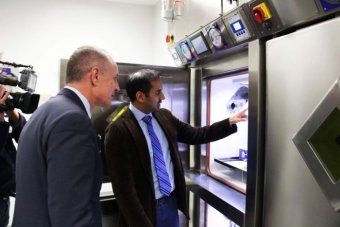South Australia is keen to be at the forefront of better cancer treatments and is lobbying for federal support to establish a proton therapy and research centre.
Director of radiation oncology at the Royal Adelaide Hospital Associate Professor Michael Penniment said proton therapy could avoid current side effects of radiotherapy.
“Proton therapy is a way of being able to stop the radiation before it hits normal tissues,” he said.
“That’s fantastic for all of our children that are having radiation therapy, but also [for treating] tumours that are close to critical structures like spinal cords where proton therapy still cures the cancer, but it stops before it gets to the critical normal tissue.”
The treatment currently is unavailable in Australia and the Federal Government pays for about 10 Australians per year to travel overseas for proton therapy treatment at a cost of about $200,000 per patient.
Professor Penniment said making the treatment available in Australia would be a cheaper option and allow more people to benefit from it.
“[It could help] 600 or 800 patients across Australia who have no other curative option for treatment,” he said.
“A lot of those patients don’t even know they’re missing out [at present].”
Jay Weatherill writes to PM seeking funding
The SA Government said it would cost about $280 million to establish a proton therapy centre as part of Adelaide’s new city biomedical precinct and urged the Federal Government to back the plan with funding.
Premier Jay Weatherill said he had written to the Prime Minister and was encouraged by his receptiveness to the proposal.
Mr Weatherill said a centre could draw patients from across Australia and from overseas and create its own income stream.
“There is a substantial contribution from both the Flinders University, the South Australian Government and there is of course a business case associated with an income stream,” he said.
He said SA would be an ideal location for the treatment centre, with its a history of groundbreaking medical advances, including by the Nobel Prize-winning father and son William Lawrence Bragg and William Henry Bragg a century ago.
“Nobel Prize winner Bragg determined the technologies which sit behind these cyclotrons or particle accelerators which are at the heart of this treatment so it’s our ambition to draw on that historical tradition and have South Australia once again the home of applying this technology,” the Premier said.
Backers of the proposed venture said it could be built by 2019 if federal backing was secured.


